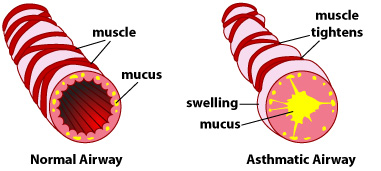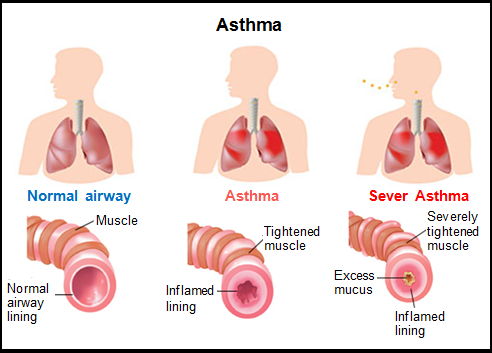Asthma is a condition that affects your airways – the small tubes that carry air in and out of the lungs. Asthma means different things to different people. Whatever asthma means to you, it’s useful to know more about how it affects you, both physically and emotionally, and why. Does it run in the family? What are the triggers for you? Are you just wanting to understand how to better help support someone…
Asthma tends to run in families, especially when there’s also a history of allergies and/or smoking. Regardless of if you have it or know someone with it or just want to know more.. It’s important to understand HOW asthma works and that asthma can be different for everyone. There is no one rule that fit’s all unfortunately. (Asthma UK, 2016)
The more you understand the condition, the better position you’re in to work out with your healthcare team (i.e. your GP, asthma nurse and/or consultant) how to manage it well. Managing it well means that asthma will affect your life as little as possible.
Sometimes asthma symptoms are mild and go away on their own or after minimal treatment with asthma medicine. Other times, symptoms continue to get worse.
When symptoms get more intense and/or more symptoms occur, you’re having an asthma attack. Asthma attacks also are called flareups or exacerbations.
Treating symptoms when you first notice them is important. This will help prevent the symptoms from worsening and causing a severe asthma attack. Severe asthma attacks may require emergency care, and they can be fatal. (NHLI, 2016)


If you have asthma:
If you’ve just been diagnosed with asthma, or even if you’ve had the condition for many years, you may have a long list of questions. To help you find some answers, i’ve tried to provide some useful pages with both factual information and what asthma personally means to me. As well as what i have learned first hand about asthma. (Asthma UK, 2016)
If you think you may have asthma:
Asthma is a complex condition to diagnose. Quite often it’s a case of ruling out other things, but if you think you may have asthma see your GP and ask for a review. You may find it useful to look at the list of symptoms first to see how likely it is, however as said above asthma affects everyone differently and as much as there is common typical symptoms with asthma that doesn’t mean to say you can’t have asthma and have none of the typical symptoms. There are different types of asthma for example cough variant asthma, silent asthma, allergic asthma.. Some may have a wheeze, some may not.. some may have a cough when their asthma is bad and some may just feel tight chested. (asthma UK, 2016)
How does asthma affect the airways?
When a person with asthma comes into contact with something that irritates their sensitive airways (an asthma trigger), it causes their body to react in three ways:
- the muscles around the walls of the airways tighten so that the airways become narrower
- the lining of the airways becomes inflamed and starts to swell
- sticky mucus or phlegm sometimes builds up, which can narrow the airways even more.
These reactions cause the airways to become narrower and irritated – making it difficult to breathe and leading to asthma symptoms, such as chest tightness, wheezing, or coughing. (Asthma UK, 2016)
Who gets asthma?
In the UK, around 5.4 million people are currently receiving treatment for asthma. That’s one in every 12 adults and one in every 11 children. Approximately five per cent of people with asthma have severe asthma. (Asthma UK, 2016)
Can asthma be cured?
Asthma UK is striving to find a cure, but currently there is no cure for asthma. The good news, though, is that there are lots of safe and effective treatments available to manage the symptoms. You just need to work with your GP or asthma nurse to find the ones that work well for you, and get into good habits so you take them exactly as prescribed, so you can get the benefits. Asthma is considered a ‘reversable’ condition, this is due to the fact that asthma is effectively an inflammation and reaction in the airways. Reduce the inflammation and the person will no longer be suffering with asthma symptoms. This would be in comparison to something such as COPD (coronary obstructive pulmonary disorder) where the airways and the aveoli in the lungs are scarred and damaged and will never improve. Asthma when well managed and well controlled can be very minimal and people can continue with their lives with little to no symptoms. Some people go years without any symptoms at all. It’s all down to the management, the severity and what the persons triggers are. (Asthma UK, 2016)
Even when you feel fine, you still have the disease and it can flare up at any time.
However, with today’s knowledge and treatments, most people who have asthma are able to manage the disease. They have few, if any, symptoms. They can live normal, active lives. If you have asthma, you can take an active role in managing the disease lowering your risk of serious attacks. (NHLI,2016)
Is asthma a serious condition?
Tragically, three people die every day because of asthma attacks and research shows that two thirds of asthma deaths are preventable. The reassuring fact is that most people with asthma who get the right treatment – and take it correctly – can manage their symptoms and get on with what they want to do in life. (Athma UK – What is asthma, November 2016)
Common asthma symptoms:
- Wheezing
- Coughing
- Shortness of breath
- Tightness in the chest
Other symptoms include:
- Taking longer to get over a cold/cough
- Having frequent chest infections/coughs
- Waking up at night short of breath/tight chest
- Getting short of breath easier
- Blue fingernail beds or lips
- Rapid breathing.
- Sighing.
- Fatigue; inability to exercise properly.
- Difficulty sleeping.
- Anxiety; difficulty concentrating.
- Chronic cough without wheezing (cough-variant asthma) often a dry hacking cough.
Not all people who have asthma have these symptoms. Likewise, having these symptoms doesn’t always mean that you have asthma. T
The types of asthma symptoms you have, how often they occur, and how severe they are may vary over time. Sometimes your symptoms may just annoy you. Other times, they may be troublesome enough to limit your daily routine.
Severe symptoms can be fatal. It’s important to treat symptoms when you first notice them so they don’t become severe.
With proper treatment, most people who have asthma can expect to have few, if any, symptoms either during the day or at night. (NHLI, 2016)
What Causes Asthma Symptoms To Occur?
Many things can trigger or worsen asthma symptoms. Your doctor will help you find out which things (sometimes called triggers) may cause your asthma to flare up if you come in contact with them. Triggers may include:
- Allergens from dust, animal fur, cockroaches, mold, and pollens from trees, grasses, and flowers
- Irritants such as cigarette smoke, air pollution, chemicals or dust in the workplace, compounds in home décor products, and sprays (such as hairspray)
- Medicines such as aspirin or other nonsteroidal anti-inflammatory drugs and nonselective beta-blockers
- Sulfites in foods and drinks
- Viral upper respiratory infections, such as colds
- Physical activity, including exercise
Other health conditions can make asthma harder to manage. Examples of these conditions include a runny nose, sinus infections, reflux disease, psychological stress, and sleep apnea. These conditions need treatment as part of an overall asthma care plan.
Asthma is different for each person. Some of the triggers listed above may not affect you. Other triggers that do affect you may not be on the list. Talk with your doctor about the things that seem to make your asthma worse. (NHLI, 2016)
How Can Asthma Be Prevented?
You can’t prevent asthma. However, you can take steps to control the disease and prevent its symptoms. For example:
- Learn about your asthma and ways to control it.
- Follow your written asthma action plan.
- Use medicines as your doctor prescribes.
- Identify and try to avoid things that make your asthma worse (asthma triggers). However, one trigger you should not avoid is physical activity. Physical activity is an important part of a healthy lifestyle. Talk with your doctor about medicines that can help you stay active.
- Keep track of your asthma symptoms and level of control.
- Get regular checkups for your asthma.
(NHLI, 2016)
Referereces:
Asthma UK (November 2015) Understanding asthma better. Accessed 29/01/2017 [https://www.asthma.org.uk/advice/understanding-asthma]
Asthma UK (November 2015) What Is asthma. Accessed 29/01/2017 [https://www.asthma.org.uk/advice/understanding-asthma/what-is-asthma]
NHLI (2016) What are the signs and symptoms of asthma. Accessed 29/01/2017 [https://www.nhlbi.nih.gov/health/health-topics/topics/asthma]



